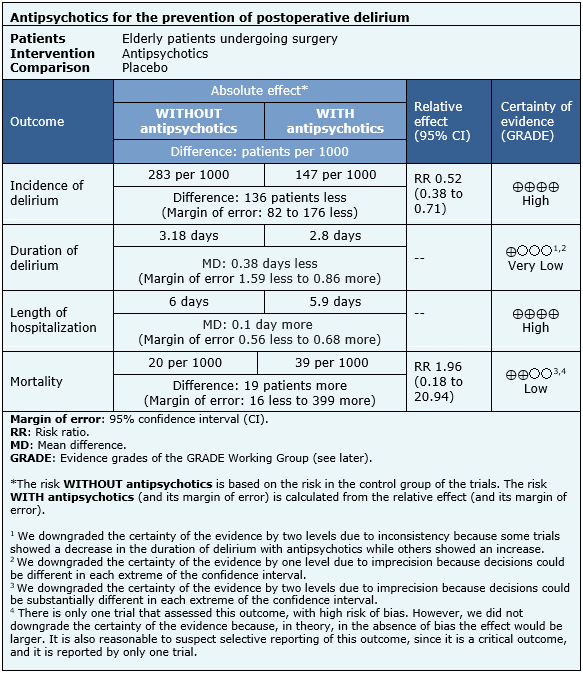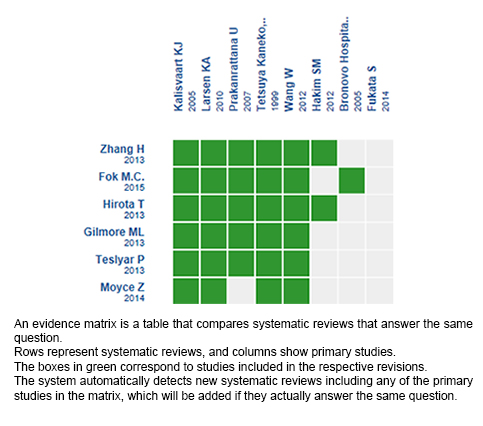Epistemonikos summaries
← vista completaPublished on April 20, 2018 | http://doi.org/10.5867/medwave.2018.02.7195
Are antipsychotics effective for the prevention of postoperative delirium?
¿Son los antipsicóticos efectivos para prevenir el delirium postoperatorio?
Abstract
INTRODUCTION Antipsychotics have been proposed as a pharmacological alternative to prevent postoperative delirium. Nonetheless, their actual clinical benefits and harms are a matter of debate.
METHODS To answer this question, we used Epistemonikos, the largest database of systematic reviews in health, which is maintained by screening multiple information sources, including MEDLINE, EMBASE, Cochrane, among others. We extracted data from the chosen systematic reviews, reanalyzed the data from the primary studies, conducted a meta-analysis and generated a summary of findings table using the GRADE approach.
RESULTS AND CONCLUSIONS We identified 16 systematic reviews that included eight primary studies, all were randomized trials. We concluded the use of prophylactic antipsychotics reduces the incidence of postoperative delirium, but has no effect on the duration of hospital stay and might increase mortality.
Problem
Postoperative delirium is associated to an increase in morbidity, mortality, prolongation of hospital stay and increased costs, especially in elderly patients.
Several non-pharmacological interventions have been proposed in order to reduce the incidence of this complication, but the role of pharmacological alternatives is still controversial. It is known antipsychotics are effective in the prevention of delirium. However, their efficacy and safety in the postoperative context are not yet clearly established.
Methods
To answer the question, we used Epistemonikos, the largest database of systematic reviews in health, which is maintained by screening multiple information sources, including MEDLINE, EMBASE, Cochrane, among others, to identify systematic reviews and their included primary studies. We extracted data from the identified reviews and reanalyzed data from primary studies included in those reviews. With this information, we generated a structured summary denominated FRISBEE (Friendly Summary of Body of Evidence using Epistemonikos) using a pre-established format, which includes key messages, a summary of the body of evidence (presented as an evidence matrix in Epistemonikos), meta-analysis of the total of studies when it is possible, a summary of findings table following the GRADE approach and a table of other considerations for decision-making.
|
Key messages
|
About the body of evidence for this question
|
What is the evidence. |
We found 16 systematic reviews [1],[2],[3],[4],[5],[6], |
|
What types of patients were included* |
Four trials included patients undergoing orthopedic surgery [17],[18],[20],[21], two included patients undergoing cardiovascular surgery [19],[22], two included patients undergoing gastrointestinal surgery [18],[23], and one trial mentioned the participants were not submitted to cardiovascular surgery [24]. Average age was reported in six trials [17],[20],[21],[22],[23],[24], ranging between 61 and 87 years, with an average of 74.6 years. All the trials reported the gender of included participants. The average proportion of men was 50.4%, with a range from 20.2% to 68.3%. |
|
What types of interventions were included* |
Typical (haloperidol) and atypical (risperidone, olanzapine) antipsychotics were used in the trials. Five trials used haloperidol, between 0.5 and 5 mg intravenously [17],[18],[20],[23],[24]. Two trials used risperidone 0.5 mg [20] and 1 mg [23]. One trial used olanzapine 5 mg [22]. In most of the trials the intervention was postoperative [17],[18],[19], and in two trials [20],[21] it was administered before and after surgery. All trials compared against placebo. It is important to note the trials did not make any distinction according to psychomotor activity of delirium, except for one trial [19] that applied the intervention to ‘subsyndromal delirium’. |
|
What types of outcomes |
The main outcomes evaluated by the systematic reviews were: incidence of postoperative delirium, duration of delirium, days of hospitalization, length of stay in intensive care unit, severity of delirium, safety of haloperidol, and mortality. |
* The information about primary studies is extracted from the systematic reviews identified, unless otherwise specified.
The main outcomes evaluated by the systematic reviews were: incidence of postoperative delirium, duration of delirium, days of hospitalization, lenght of stay in intensive care unit, severity of delirium, safety of haloperidol, and mortality.
Summary of Results
The information about the effects of antipsychotics for the prevention of postoperative delirium is based on eight randomized trials [17],[18],[19],[20],[21],[22],[23],[24] that included 1932 patients overall. Seven trials reported the incidence of delirium [17],[18],[19],[20],[21],[22],[23],[24]; four trials reported the duration of delirium [19],[20],[21],[24]; four trials reported the length of hospital stay [19],[20],[22],[24]; and only one trial reported mortality [19]. The summary of findings is the following:
- The use of prophylactic antipsychotics reduces the incidence of postoperative delirium in elderly population. The certainty of the evidence is high.
- It is not clear if the use of prophylactic antipsychotics reduces the duration of postoperative delirium, because the certainty of the evidence is very low.
- The use of perioperative prophylactic antipsychotics has little or no effect in the length of hospital stay in elderly patients. The certainty of the evidence is high.
- It is not clear whether prophylactic antipsychotics increase or reduce postoperative mortality in the elderly population, because the certainty of the evidence is low.


Other considerations for decision-making
|
To whom this evidence does and does not apply |
|
| About the outcomes included in this summary |
|
| Balance between benefits and risks, and certainty of the evidence |
|
| Resource considerations |
|
| What would patients and their doctors think about this intervention |
|
|
Differences between this summary and other sources |
|
| Could this evidence change in the future? |
|
How we conducted this summary
Using automated and collaborative means, we compiled all the relevant evidence for the question of interest and we present it as a matrix of evidence.

Follow the link to access the interactive version: Antipsychotics for the prevention of postoperative delirium
Notes
The upper portion of the matrix of evidence will display a warning of “new evidence” if new systematic reviews are published after the publication of this summary. Even though the project considers the periodical update of these summaries, users are invited to comment in Medwave or to contact the authors through email if they find new evidence and the summary should be updated earlier.
After creating an account in Epistemonikos, users will be able to save the matrixes and to receive automated notifications any time new evidence potentially relevant for the question appears.
This article is part of the Epistemonikos Evidence Synthesis project. It is elaborated with a pre-established methodology, following rigorous methodological standards and internal peer review process. Each of these articles corresponds to a summary, denominated FRISBEE (Friendly Summary of Body of Evidence using Epistemonikos), whose main objective is to synthesize the body of evidence for a specific question, with a friendly format to clinical professionals. Its main resources are based on the evidence matrix of Epistemonikos and analysis of results using GRADE methodology. Further details of the methods for developing this FRISBEE are described here (http://dx.doi.org/10.5867/medwave.2014.06.5997)
Epistemonikos foundation is a non-for-profit organization aiming to bring information closer to health decision-makers with technology. Its main development is Epistemonikos database (www.epistemonikos.org).
Potential conflicts of interest
The authors do not have relevant interests to declare.

